Ellen and Jim Have a Blog, Too
We are two part-time academics. Ellen teaches in the English department and Jim in the IT program at George Mason University.


_Mansfield Park_ Madness · 23 August 08
Dear Friends,
On Austenprose, Laurel Ann declared this hot month of August “Mansfield Park Madness and has been posting about this beloved book for days and days. This (honestly) as a lead-up to her and my diptych review of recent editions of Mansfield Park, focusing on the latest Oxford and (as it has turned out) new Penguin editions: genuine competitors for the half-way house market (the sort of edition of Austen that gives you a decently long essay introduction, and moderate size appendices, notes, chronologies).
For my part I’ve been reading some of the criticism of this book and rewatching the three shorter film adaptations (1990 independent Metropolitan written, directed, produced by Whit Stillman; 1999 Miramax MP written and directed by Patricia Rozema, and 2007 ITV MP, screenplay Maggie Wadey, directed by Iain MacDonald, produced by Susan Harrison). I’ve not rewatched the 1983 BBC masterpiece, Mansfield Park, written by Ken Taylor (of among other films, Jewel in the Crown fame), directed by Giles Foster, produced by Betty Willingale because I spent at least 2 months studying it last spring.
I enjoyed myself watching not only these films, but (among others) the 2001 BBC Aristocrats, written by Harriet O’Carroll, directed by David Caffrey, produced David Snodin (he did the brilliant 2007 ITV Persuasion) and studying yet more essays on films. Among them a strange pair of texts by Raymond Bellour (“To analyze, to segment” and “The Elusive Text”). Bellour argues that even after movies break through the denigration they are subjected to as recent art forms which are commodities made (many of them) to appeal to the widest mass audience, they will still be hard to write about as they are inescapably elusive. Swift moving images of sound, light, sensuality, how quote them, how even get into contact beyond a false impression without freeze-frame software (that does exist nowadays), and then you are dependent on the still, dialogue and memory. The way to study a film he says (and I agree) is to subdivide them into tiny segments, and contemplate, meditate, write about one’s visual-aural response to the stills with the dialogue coming in as epitomizing or capturing what is happening before us nonverbally.
That’s what I found the 2007 Mansfield Park lent itself to in particular. For Metropolitan, text was equally central; for Rozema’s 1999 Mansfield Park, comparison with Austen’s juvenilia and novel, yielded insights. But the 2007 MP was like Wadey’s 1987 NA: it projects images & uses music which transcend verbal equivalents, and unlike the 1987 NA, partly a result of such a brief time for such a complex novel, it departs radically from the book in the second half while keeping to its central themes as Wadey understood these. I wrote about what I found in the movie on Austen-l and Eighteenth Century Worlds at Yahoo, and Ms Place (Vic) who has been charmed by our MP madness, put my two postings onto Jane Austen’s World: Mansfield Park, 2007: Another perspective.
In a nutshell, my argument is this: as the 1972 Emma may be said to be a filmic recreation of Austen’s book based on 1960s criticism of Austen’s novel (especially that of Mark Schorer on the humiliation of Emma and psychological studies of her as frustrated and strained to the point of neuroticism) and the 1999 MP a filmic recreation of Austen’s book based on 1990s criticism of the novel as not sufficiently about slavery and the empire which supported the wealth of the English gentry, and a number of other Austen films connected to her novels through this or that critical school; so Wadey’s film represents a return to the Trilling, Tanner, and Avrom Fleischman perspective which values peace, quietude, human worth, a principled refusal to perform falsely, to network as we say, in order to hold fast to the self, against life’s continual chaos and cruelties. This combines with its rejection of hierarchy, artifice, the domination of upper class mores and aesthetics which were central to the culture of deference in favor of the natural world: see MP: a natural heroine I and II.
My argument is the animating force of The Aristocrats is the opposite to the animating force of the 2007 MP: in the 2001 Aristocrats we are led to value artifice, and much of the aesthetics of the upper class in the eighteenth century; and want to have the sweetness of their life as so famously yearned for by Talleyrand (as also embodied in the 1983 MP which has Chekhovian scenes).
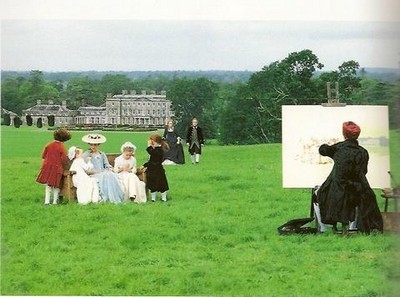
An imitation of a typical mid-eighteenth century painting: we see an idealized group of family and friends doing things, usually having to do with the arts or sciences. It’s a very self-conscious still, for its self-reflexive (it has a painter painting them), it projects the new idealization of maternity which Rousseau proselytized for and Emily (played by Geraldine Somerville as the central mother figure) embodied, it shows off the lord’s wealth (as these paintings were meant to). Finally the film-makers know one draw of such films is the green idyllic Arcadia – a product of wealth and enforced cheap labor.
In the 2007 MP, we are not permitted to see these as enjoyable, but only the bullying stance of those in charge. The menace of those in power, life as confronting bullying and control everywhere is to the fore in the stills and movement images of the 2007 MP.
This film is then a comment on our era. One real flaw with it is not enough money was spent. It’s very easy to land on lousy stills. The film-makers had a limited budget and shooting time and many of the times are bad – the actors look bad, the scene is not controlled. I’ve studied and studied the 1995 S&S by Ang Lee and Emma Thompson. I cannot find one still, one moment which is not perfect for his purpose, epitomizing, comic, poignant, meaningful and beautiful in some way. He & she spent much thought much much thought, time and money to make it so. The 2007 film also shows how absurd film-makers can become when they try to be faithful in the sense that the first half contains a sort of outline of the book because the film-makers thought they had to have one. The film improves enormously in the second half because it continually departs radically from the book.
It is also true that if Austen was Rousseauian in this film, she valued hierarchy and artifice so the surface aesthetics of this film is very unlike her, but then it is meant to be a modern take, a commentary. And the intense romance that sweeps through so many of these films is also unAusten. She is basically an unromantic writing love stories :) She would to my way of thinking have a strong sceptical response to the idealization of Aristocrats.
I love this theme of retreat, quietude, integrity, anti-hierarchy and false performance, and think it can be drawn from Austen’s own stance as a whole from her letters and is not against the grain of the books at all, fits Fanny Price. Here is the moment when Edmund (Blake Ritson) falls in love with Fanny (Billie Piper); the family gathered together reading, Tom (James D’Arcy, funnily his racing papers), all the while this Lady Bertram (Jemma Redgrave) knows Fanny is in love with Edmund.
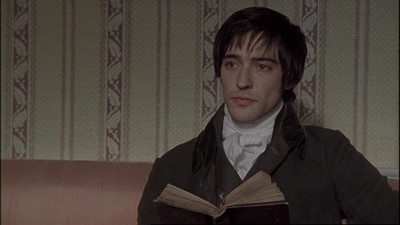
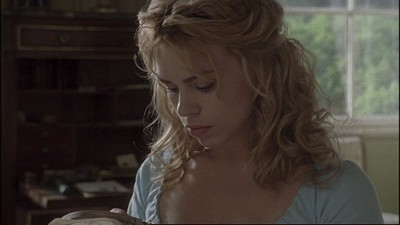
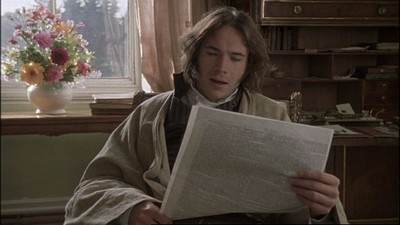
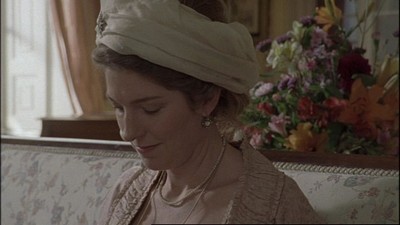
The poem that Fanny is reading aloud to Lady Bertram: Silent and chaste she steals along far from the world’s busy throng, with gentle yet prevailing …” William Cowper, “Boadicea.” Quiet plain flowers in the background, in pots.
I really probably prefer the Billie Price figure with her melancholy and withdrawnness, her anorexic sullenness (and even the blanc mange forced breasts) to Frances O’Connor’s aggressive upbeat brightness in Rozema’s film.
Finally, in a way the film was deliberately using a sort of shorthand. I liked the repeating music and I liked the quiet melancholy of the piece as a whole
I must and will write a blog on O’Caroll’s mini-series when I’ve finished carefully watching it. I admit I love it too.
Do go over and read what I wrote for Jane Austen’s World. You will have the pleasure of Ms Place’s beautifully set up blog, and 12 stills, two Chekhovian ones from the 1983 MP, and yet another alluring one from the 2001 Aristocrats.
Ellen
--
Posted by: Ellen
* * *
Comment
- Clare wrote:
“I can see the bullying aspect in modern British life too. We are the most watched nation in Europe, if not the West, CTV cameras in all public places, one is filmed , on average, 300 times a day. The police say most of the footage is ineffectual, so what’s it for if not to generate a feeling of Big Brother is watching. The Government is continually hectoring us on health, diet and above all on security. This is the most intrusive Parliament of my lifetime, and there is an undercurrent of anti-Brown, ant-Establishment feeling in many middle-class areas. So in short, both the the menace and bullying as reflected in the 2007 MP is quite valid IMO.
Clare”
I replied:
That’s very interesting. This is a rare film among the Austen canon (so to speak) to have this atmosphere. As I wrote last night, there is a strong dislike of false social life, a real thrust into retreat, qualified so that you won’t quite end up like Tom, retreat among a small group of true friends. This is Austen’s ending for her books.
I’ve just read some startling remarks by Margaret Drabble in her Waterfall. She has written more than her conventional essays on Austen (which are introductions to either the Bantam or Signet reprints a few years ago): there’s very original sequel-short story which is a riff or plays on and reenacts Austen’s novels. She describes Austen’s books there as having a “desperate wit” and the moralism a kind of front. This is D.W. Harding but with a very different feel.
When I wrote about the 1987 NA in the essay I put on Jane Austen’s World I found careful “close reading” or viewing showed the film to reflect feelings and ideas about society through a use of picturesque and gothic; the film also kept more and different parts of the dialogue of Austen’s book than the recent one—as the 2007 MP does keep striking lines and rearranges them.
Thank you for the comment—as I don’t live in the UK (or only in my imagination and books). I can vouch for the disappearance of the old culture of deference and think the idea of nature over artifice is true. The “hairstyle” given Fanny is just the same found in Scarlet Johansson in Woody Allen’s Vicky, Christina, Barcelona, which is by the way a movie well worth going to:
http://server4.moody.cx/index.php?id=939.
— Elinor Aug 23, 9:00pm # - From Mari Webb on Austen-l:
“Hi, Ellen!
As always I find your movie notes very interesting and worth reading :-)
I’m in a bit of a minority in rather liking Rozema’s interpretation of MP in 1999—yes she played fast and loose with the story in some respects, but to be honest, I got much more of a sense of the underlying menace contained within MP from her version than from the 2007 one.
It wasn’t the fact that they made changes to the story that bothered me in the 07 version. Main problems I can think of off the top of my head:
1) Fanny running around and laughing in just about every second scene…this works in Davies’ P&P for Lizzie, but not for Anne Elliot in the new Persuasion or Fanny Price in this version; neither of them are hearty, tomboyish, or healthy.
2) Watering down (to a much greater degree than Rozema did) of the complex secondary characters. This may well have been a function of budget and filming time available, but it means that Sir Thomas’ losing his temper at Fanny is not given enough buildup and emotional context and therefore seems out of place. It is better to do what Rozema did if you have limited time and screen space—focus on the possible cruelty in his nature that JA keeps under the surface most of the time. We don’t really get enough of a sense of Fanny’s oppression either, the Bertrams are painted as far more supportive and nurturing of Fanny than they are in the book. Contrast this to scenes in Rozema’s version such as Mrs. Norris’ publicly humiliating Fanny before company by treating her like a servant; while perhaps not developed to the extent it is in the book we are drawn into Fanny’s emotional turmoil and feelings of inadequacy.
3) The picnic instead of a dance was a change one can get away with. Not having Fanny go back to Portsmouth loses the entire emotional impact of the contrast between the two homes and her difficulties about deciding where and how she fits in.
4) Henry and her almost kissing in the garden when she has NOT accepted his proposal and never will is a radical misreading of Fanny’s character. Rozema gets away with the kiss not only because she has given Fanny aspects of Jane Austen’s own character (we can believe there are passionate feelings under Fanny’s quiet nun like exterior the way Francis O’Connor plays her) but because the kiss only happens when Fanny has decided to accept Henry’s proposal, although she changes her mind the next day, just as Jane Austen herself did.
5) Most of all for me: in the 07 version there was a total lack of subtlety in the way the production was filmed, written and directed. A film is inevitably less subtle than the book it is based on. Rozema’s version does not keep all the nuances of the book either. The difference is that Rozema has chosen to make explicit in her film things that are at the least very strongly implied in JA’s text. The main radical departure in her version from the text itself is the conflation of Fanny with Jane Austen, which again I feel was done for the purposes of making the movie work as a film text, not because she lacked understanding of the original book.
Just my two cents worth on these particular versions,
Cheers,
Mari.”
— Elinor Aug 23, 9:02pm # - IN response to Mari,
I agree with you that the Fanny Price (Billie Piper) and Anne Elliot (Sally Hawkins) were both curiously debilitated kinds of presences. This could be the result of their thinness and small ness—anorexia has become a part of the way young actresses on screens look; this wretched thinness (with arms like sticks) makes them look frail and childish. It’s incipiently pornographic. You can see the same thing in the women of the casts and in the 2005 P&P; Keira Knightley is just the most obvious.
I also agree about the compression. The 2007 MP was just too short, and I feel the reason the second half of the movie is much better is the film-makers gave up trying to follow the book. It meant they eliminated Portsmouth, but watching the film I felt this literal fidelity was not a loss as the theme of the movie came across differently.
I feel the theme is one which condemns society sharply; not only is the film “for nature,” but it is Rousseauistic. This distrust of society as hollow, meaningless, and something one should avoid came out sharply in a number of the conversations in the second half, especially in those in which Edmund spoke. A few more details I took down:
Tom too is too little with others, and he falls into desuetude, and alcoholism. But too much society is much worsr. The poem that Fanny is reading aloud to Lady Bertram: Silent and chaste she steals along far from the world’s busy throng, with gentle yet prevailing …” William Cowper Boadicea. When they star-gaze he is not drawn back by Mary (in the first half)
As in the image I chose for this blog for 2007 MP, this Edmund falls in love with Fanny in the stillness of an evening when he sits reading and she is helping Lady B with sewing, Tom reading racing papers.
for me, indecorums which are anachronistic don't seem important because all the films use so much anachronism of all sorts.
Ellen
— Elinor Aug 23, 9:04pm # - From Marjorie Gilbert:
“Thank you for posting, Ellen! I enjoyed reading it…
Marjorie”
— Elinor Aug 24, 7:38am # - I enjoyed your two blogs very much, Ellen – as you know, I also feel the Wadey version has been much maligned. I now have this one on DVD (it was one of a number given away with a newspaper) and will watch it again after finishing my viewing of Aristocrats. I also appreciate your comments on this series – I saw the “bathing in cream” bit today! I’m enjoying it, but it does seem to give a rather rosy/soft-focus view of aristocracy and wealth compared to the book.
— Judy Aug 24, 2:40pm #
commenting closed for this article
